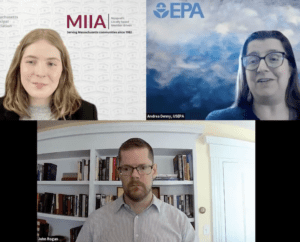Who is a member?
Our members are the local governments of Massachusetts and their elected and appointed leadership.

The MMA hosts a webinar about a new two-stage federal grant program that will use nearly $5 billion in Inflation Reduction Act funds to deploy greenhouse gas reduction strategies across the nation. Pictured are (clockwise from top left) MMA Legislative Analyst Josie Ahlberg, Andrea Denny from the State and Local Climate and Energy Program, EPA and John Rogan from the air and radiation division, EPA Region 1.
The MMA hosted a free webinar today about a new two-stage federal grant program that will use nearly $5 billion in Inflation Reduction Act funds to deploy greenhouse gas reduction strategies across the nation.
Representatives from the U.S. Environmental Protection Agency gave municipal officials an overview of the new Climate Pollution Reduction Grants program.
The first tranche of funding from the program is $250 million in noncompetitive planning grants to states, local governments, tribes and territories to develop innovative strategies to reduce climate pollution and build clean energy economies. The program provides flexible planning resources for grant recipients to develop and implement scalable solutions that protect people from pollution and advance environmental justice.
Each of the 67 most populous metropolitan areas in the country are eligible to receive $1 million in planning grants, including two Massachusetts-based areas: the Boston-Cambridge-Newton, MA-NH MSA, which covers 188 municipalities, and the Worcester, MA-CT MSA, which covers 48. Municipalities outside of these metropolitan areas will have the opportunity to collaborate with their state on planning and be eligible to apply for implementation funding activities identified in the state’s plan.
The MMA webinar allowed municipal leaders from the eligible metropolitan areas to hear from EPA Region 1 staff, review key application details, and ask questions. The session emphasized the urgent need to address climate change on a local and regional level — efforts that the climate grants are designed to support and accelerate.
EPA staff highlighted the importance of collaboration and communication among eligible municipalities in the weeks ahead, as the Boston and Worcester metro areas organize to submit a notice of intent to participate by April 28. Many metro areas across the country, including the two Massachusetts-based areas, will need to work with municipalities across state borders to participate, a characteristic that is unique to the Climate Pollution Reduction Grants program.
For more details on the planning grants and the application process, see the CPRG Program Guidance document on the EPA website. Answers to frequently asked questions can be found in the CPRG Updates and Questions section. Additional questions can be directed to CPRG@epa.gov.
• Climate Pollution Reduction Grants: Planning Grants presentation (550K PDF)